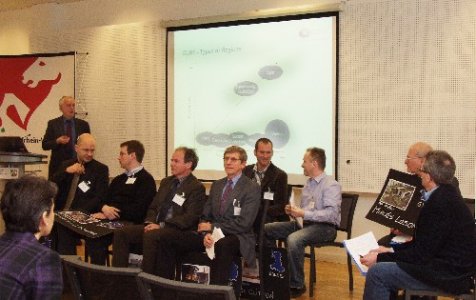„Virtuous Circle“ of regional development
Results of the European three-year research project „Corporate Culture and Regional Embeddedness“(CURE) – International Conference in Brussels, Representation of the State of North Rhine-Westphalia to the European Union, organized by the Institut for Work and Technology (IAT)
Pressemitteilung vom 11.12.2009
Redaktion:
83
Even international companies are embedded in their regional context; this is one of the main messages of the CURE project. They depend on regional workforces, customers and networks in order to be successful. Regional engagement is a strategic option for meeting a number of challenges faced by every single company in a global world. How corporate and regional cultures interact and how they influence each other, how to generate a “virtuous circle” of regional development, these were the key questions of the European three-year research project “Corporate Culture and Regional Embeddedness” (CURE). The results of the multidisciplinary study involving 210 companies in seven European regions were presented at the final conference in Brussels, 3rd December 2009.
Companies
The CURE project has focused its studies on four fields of investigation – innovation, quality of life, human resources and environmental responsibility, which were most appropriate for studying the interaction between regional and corporate cultures. A significant number of the involved companies are strongly embedded in the region and they are involved in several regional activities, while others are more footloose, is one of the CURE results. “The percentage of regional engaged companies in the CURE sample is on average quite high in all seven regions, and even over 50 percent in some of the regions” reported Dr. Stefan Gärter, Project Coordinator / Institute for Work and Technology (Gelsenkirchen). Bigger companies score higher on regional engagement than medium-sized. Companies are stronger involved regionally, the longer they have been established in the region. There is also empirical evidence that foreign-owned companies score significantly lower in terms of regional engagement. But in some cases they also can contribute to positive interaction between external cultural influences and regional culture.
Regions
The empirical results of CURE point out, that the most interaction takes place in those regions where corporate and regional actors actively contribute to cultural change in joint initiatives like networks by using a wide variety of mechanisms. Networking activities – informal, local or job-related – are vital for the interaction between corporate and regional cultures to become a “virtuous circle”: a circle whereby regional distinctiveness, but also regional continuity and identity are achieved through permanent renewal and change.
The interactions between both regional and corporate cultures differ from region to region, from time to time, and also from company to company. One can find regions with high level of trust and long standing forms of cooperation, as in the South-East Netherlands region where “the best of different worlds” is combined. Prof. Emile Aarts, Vice President Philips Research Laboratories, gave an account of the successful Discovering New Venues in Open Innovation in the region at the conference. In the research region Styria the traditionally vertically integrated corporate cultures increased being complemented by co-operative and trust-based types of corporate culture. The two economical and political shifting regions Györ and South-West Brandenburg are rather in the phase of building up trust and networks. And in the case of Wales it is the region itself which has more recently come to be promoted as a brand, not only by regional firms offering welsh-branded products, but also by the regional government. In East Westphalia-Lippe the particular regional cultures gave rise to a number of long-established family companies offering high-quality products. These were probably created initially through local and regional customers demanding long-lasting quality products, which in course of time have come to sell well even in international markets.
Policy Recommendations
The CURE-Project identified a number of key insights and interesting concepts for further development of both the vision of regionally embedded companies and the concept of innovative regional cultures. “The interaction between companies and regions should be seen as a dynamic process that has to be balanced permanently”, said Peter Prud’homme van Reine, project partner and co-author of the CURE Comparative Analyses Report which he conducted with his colleague Prof. Dr. Ben Dankbaar / Radbound University Nijmegen. Paradoxically, to sustain regional continuity und identity, regions have to renew themselves permanently in order to remain competitive in the global competition by regional distinctiveness. In this process, regional involvement is a strategic option for all types of companies. They are more likely to do so if the interacting corporate and regional actors develop a shared frame of reference as to where the region ought to be heading.
PD Dr. Dieter Rehfeld, CURE Project Director / Institute for Work Technology named three key aspects for regional and companies actors: (1) the need of a governance structure that allows space for distinctive forms of regional development based on regional cultures; (2) the communication of regional cultures’ key aspects by using symbols, such as pictures, icons, stories, heroes, etc.; and (3) strengthening of forms of regional interaction in such a way that these are not merely the aggregation of individual strategies, but the result of concerted action.
Project and Partners
The CURE study has been conducted by means of thirty company case studies and three in-depth studies in each of the seven regions: South-East Netherlands, the Basel Area (Switzerland), East Westphalia-Lippe (Germany), South-West Brandenburg (Germany), the Gyor Region (Hungary), Styria (Austria) and Wales/ United Kingdom, bringing together researchers from cultural science, regional science, social science and economics.
The project consortium is made up of seven partners from six European regions:
Institute for Work and Technology, Gelsenkirchen/Germany; Széchenyi István University, Györ/Hungary; Cardiff University, Cardiff (Wales)/United Kingdom
Institute for Advanced Studies in Humanities, Essen/Germany; Radboud University Nijmegen, Nijmegen/ The Netherlands; University of Applied Science Northwestern Switzerland, Olten/Switzerland, Vienna University for Economics and Business, Vienna/Austria.
Für weitere Fragen stehen Ihnen zur Verfügung:
Alexandra David(Innovation, Raum & Kultur)
Stefan Gärtner(Raumkapital)
Dieter Rehfeld(Innovation, Raum & Kultur, Industriepolitik)

Interactive results presentation at the CURE final conference in Brussels. Foto:IAT
